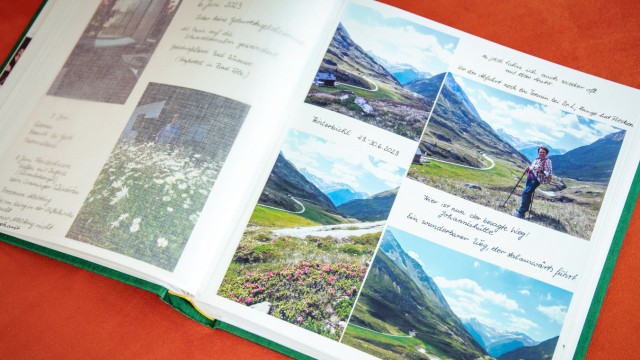It was December when Josefine Bichler discovered a whitish blister on her tongue. She thought nothing of it. Her dentist suspected inflammation, and her dermatologist, when asked, prescribed cortisol. When it didn’t get better, an ear, nose and throat (ENT) doctor recommended vinegar tincture. February of last year came and the Gautinger’s left eye began to water. The ophthalmologist couldn’t help, her ENT took a swab, but with no result. Meanwhile, Josefine Bichler’s tongue had started to burn. She was sure: something was wrong.
It wasn’t until March that an oral and maxillofacial surgeon finally found the solution. After various scans and a biopsy, in which a sample of her tongue was taken and examined, it was clear: a tumor was growing in Josefine Bichler’s mouth. She had tongue cancer.
Cancer has long been considered a widespread disease among doctors; they diagnose around 500,000 cancers per year across Germany. The mammary glands and prostate, the large intestine and the lungs are particularly frequently affected. The type of cancer that Josefine Bichler suffered from – a form of oral cavity carcinoma – is rarer. Around 10,000 people get it every year, the majority are men.
“Especially when it comes to the tongue, more and more women or patients in whom we see no obvious risk factors are now becoming ill,” says Denys Loeffelbein, head of oral and jaw surgery at the Helios Clinic West in Munich. He is Josefine Bichler’s treating doctor, “her hero,” as she puts it. Loeffelbein keeps seeing cancerous tumors in his mouth during his work. They can spread quickly. Sometimes the cheeks are affected, sometimes the lips and sometimes the tongue. “It is particularly important for a patient’s survival that the diagnosis is made early,” says the surgeon. Then the survival rate is around 80 percent. But only then.
The illness also has to be dealt with emotionally
Josefine Bichler knew from those around her how important it is to listen to your gut feeling and stick with it. This made her lucky in misfortune. Her tumor was discovered in time and could be completely removed, although it took a while to be diagnosed. If she hadn’t been too persistent, it could have taken even longer. This irritates the 68-year-old. She would like to see doctors from all disciplines better trained in this specific type of cancer: “As a patient, you put yourself in the hands of those you fall into,” she says. Her ENT doctor took a swab of her tongue at the time, but did not take any samples and analyze them – this is the only method that can be used to accurately diagnose tongue cancer. “I can only advise everyone to pay attention to changes in their body,” advises surgeon Denys Loeffelbein. “It’s better to ask a doctor too much than too little.”
Josefine Bichler was a teacher at a secondary school before she retired. She is a woman who laughs a lot and finds joy in even the little things. Red, orange and yellow tones dominate her living room in Gauting; she painted the picture on the wall of olives and lemons herself. She likes to chat. Before she talks about the cancer, she plays a song on her cell phone that gives her a lot of strength: “Hurrah, we’re still alive,” by the Italian singer Milva. Lively Discofox, Josefine Bichler sways along.
Medical brochures, bills, photo albums – the history of her illness is already on her living room table. Bichler himself has taken this into account SZ turned to share her story to raise awareness for others, in keeping with World Cancer Day this weekend. “I don’t want to complain about my suffering in my own bubble,” she says. And this despite the fact that it is not easy for her to talk about the illness. She hasn’t processed all of this yet. Too many emotions arise when she thinks about it – the helplessness, the worries, the fear that her own happiness has already been used up.
Doctor brochures, guides, photos and greeting cards: Josefine Bichler collects everything in one album. This helps her process the past year.
(Photo: Arlet Ulfers)

The album not only contains photos from sad times, but also from family celebrations or vacations. In between, Josefine Bichler writes down her thoughts.
(Photo: Arlet Ulfers)
In 1980 there was an attack on Bologna train station. 85 people died from a bomb hidden in a suitcase. Josefine Bichler and her husband should have been there at the time of the explosion. But their train from Munich left over an hour late. “We then saw the blood on the walls and the injuries. But nothing happened to us.” In the days before her operation, Josefine Bichler often thought about this experience. And she got scared. “Wasn’t that enough luck, I thought,” she says, biting her lip.
But the operation was successful. Surgeons removed about a fifth of her tongue and replaced it with tissue from her thigh. That took several hours. Afterwards, Josefine Bichler couldn’t move her head at first; her tongue was swollen for months. For a long time, the pensioner could only eat pureed food and had to undergo speech therapy because she could no longer speak as well as before. In the meantime she only has slight problems with the “R” and the “S”, which will probably remain, as well as a constant tingling sensation on her tongue. But she is tumor-free.
“The illness is my passenger”
Josefine Bichler recorded her illness and recovery in a large photo album with a green cover. This helped her process the past year. The first pages contain photos from the time in the hospital, medical brochures and get-well cards from friends and relatives. In between, Josefine Bichler wrote everything down in her neat handwriting – how she felt, what she thought about, what helped her, like in a diary. If you scroll further, the pictures become more colorful. Family celebrations, vacation photos, meetings with friends.
The tumor is gone, but the cancer is still present for Josefine Bichler; after all, she feels the implant in her mouth every day. She points to a collage in the album. Here she has stuck her face onto a picture of a motorcyclist with a sidecar. “The disease is my passenger,” she says. “But I decide the path.” She then explains how she was initially ashamed for a long time after the diagnosis. She was afraid to tell friends and acquaintances – oral cancer is particularly common in chain smokers and alcoholics. It is an illness that the majority of patients are responsible for themselves. Excessive spicy food can also be a trigger, as can HPV viruses.
Josefine Bichler smoked when she was young and she sometimes drinks a glass of wine or beer, but she doesn’t really fit into the clinical picture. Nevertheless, she was afraid of prejudice. It took time for her to get over the shame. Family and friends helped her. Now the 68-year-old wants to take away other people’s fear of the disease – and help ensure that tumors like hers are diagnosed more quickly. “If just one person hears my story and gets something clarified,” she says, “then a lot will have been gained.”
In the summer she was in East Tyrol with her husband, hiking in the mountains. Josefine Bichler likes linguistic images and metaphors, the more pictorial the better. That’s why she wanted the symbolic hiking holiday, because her husband had told her in the spring: “You’re over the mountain, now you can only go out of the valley.” The album with the green cover contains pictures of mountain passes and mountain meadows. Blue sky, just a few clouds – and in between Josefine Bichler with hiking poles and trekking pants. She laughs.
Sunday, February 4th is World Cancer Day. For those affected, the Starnberg district office recommends the Cancer Citizens’ Hotline of the Bavarian Center for Cancer Research: 0800 85 100 80

